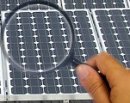The solar energy gold rush is on and there’s plenty of companies looking to cash in. Some will succeed on their own merits, but some are jumping on the coat-tails of established companies by using variations on brand names. These counterfeit wares are often sold via avenues such as online auction sites.
Suntech Power Holdings Co., Ltd., the world’s largest manufacturer of solar panels, recently gained a preliminary injunction in Germany to prevent a Hong-Kong based company from allegedly distributing products using their “Suntech” solar panel brand.
Aside from trademark issues, consumers purchasing counterfeit solar panels based on brand reputation may be getting far less than they bargained for in the equipment itself on a number of fronts. Some cheap, imported panels from unknown companies also present similar risks.
Major manufacturers have made significant investments in research and development of their products to ensure consumers can be confident in their solar panels. This research and quality control is incorporated in the price. Poorly designed panels may not be properly weatherised or generally constructed, which not only impacts on their performance, but can substantially increase the risk of electrocution or fire.
Imitation panels may not carry a warranty comparable to established brands, or if they do, there’s the prospect of the company suddenly disappearing when products start failing, only to re-emerge under another brand name.
Counterfeit, imitation and grey market solar panels, while seeming to be cheaper, can also end up costing consumers more in terms of solar power rebates and incentives.
In order for consumers to receive Australia’s $8,000 Solar Homes and Communities Program rebate or RECs (Renewable Energy Certificates) which will also become the basis of the new Australian Solar Credits program, all equipment must carry specific certifications. The ‘CE Mark’ from Europe alone is worthless in Australia for solar panels as it is a self-certification.
In the case of solar panels, the certification consumers should look for is IEC 61215, which is the International Electrical Commission’s standard. The IEC 61215 regulates the design qualification of solar panels used for long-term outdoor operations. All panels to be used in Australia also need to be registered with the relevant government authorities in order to qualify for rebates and RECs.
Australian solar power company Energy Matters recently released a consumer’s guide to buying solar power systems to help alert people to the issue of counterfeit products and a range of other questionable practices to watch for when considering investing in a home solar energy system.












































